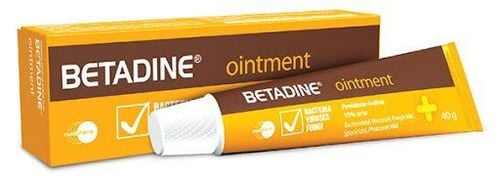This is an automatically translated article.
Treatment of hyperthyroidism helps to reduce the overactive thyroid hormone. One of the medications prescribed by doctors to treat this condition is the drug Propylthiouracil. What does Propylthiouracil do?
1. Uses of the drug Propylthiouracil
What is Propylthiouracil? Propylthiouracil is used to treat an overactive thyroid, also known as hyperthyroidism. It works by preventing the thyroid gland from producing too much thyroid hormone.
In addition, some other effects of the drug are not listed on the approved drug label, but in some cases, the doctor may prescribe the use of Propylthiouracil. Therefore, before taking the medicine, consult your doctor.
2. How to use Propylthiouracil
What does Propylthiouracil do? Propylthiouracil is available in the form of tablets with a strength of 50mg. The usual dose is 3 times a day and every 8 hours. However, depending on the medical condition and age, it can be classified as follows:
Usual Adult Dose with Hyperthyroidism: Initial dose is 100-150 mg per hour. In rare cases, patients need to take 200-300mg every 8 hours. The starting dose is continued for up to 2 months after symptoms have been completely controlled. Usual Dosage for Patients with Alcoholic Liver Damage: Use 100mg orally 3 times a day, long-term treatment can be up to several years and reduce mortality related to alcohol alcoholic liver disease. For children with hyperthyroidism: Initial dose for children from 0-4 weeks, you should use 5-10mg/kg/day for children orally in equal doses and every 8 hours. Initial dose for children from 1 month to 12 months, use 5-7mg/kg/day for children orally in equal doses every 8 hours. Initial dose for children 6-10 years old, use 50-150mg/day for children orally every 8 hours. Initial dose for children 10 years or older, 150-300mg/day for children 8 hours apart. The maintenance dose should be 1⁄3 to 2⁄3 of the initial dose and equally administered every 12 hours, usually starting 2 months after the initial dose is effective. Patients can take the drug with or without food. However, to reduce stomach irritation you can take it with food and need to take the whole tablet with a full glass of water. Use Propylthiouracil exactly as directed by your doctor, do not use more, less often, or for longer than prescribed. Use Propylthiouracil regularly to get the most benefit from it and you can stop taking it if any new symptoms appear or the condition does not improve after 7 days. Absolutely do not abuse the drug for too long for a long time. This does not make the patient's condition better, but also increases the risk of unwanted effects.
3. Unwanted effects when using Propylthiouracil
Propylthiouracil can cause some unwanted and common side effects that can be mentioned as:
Fever Abdominal pain, vomiting Mild skin rash Muscle and joint pain Decreased taste Hair loss Sore throat, dry cough Headache , dizziness Flu symptoms Pale skin, easy bruising or bleeding such as nosebleeds, bleeding gums Weakness in body Shortness of breath Body aches Severe blistering Skin peeling Red skin rash Some symptoms of illness severe liver disease such as mild fever, itching, nausea, loss of appetite, abdominal pain, dark urine and clay-colored stools, jaundice or yellow eyes. Before prescribing a drug, a doctor always considers the benefits and effectiveness of the drug Propylthiouracil. When using Propylthiouracil, it is still possible to have unwanted effects. Therefore, when unusual symptoms appear, especially when a severe allergic reaction occurs with accompanying signs such as severe dizziness, difficulty breathing, rash, swelling or itching of the face or neck area throat, tongue,... In this case, the patient should immediately notify the doctor or nurse for immediate medical intervention.
4. Some notes when using Propylthiouracil
Some notes when using Propylthiouracil brand-name drugs include:
Report a history of allergy to Propylthiouracil or any other allergies. Propylthiouracil may contain ingredients that don't work and could cause an allergic reaction or other serious problems. Report any medications you are taking including prescription and nonprescription drugs, herbal and dietary supplements, foods, dyes or preservatives. Propylthiouracil is contraindicated in patients with a history of hypersensitivity to any of its ingredients. For children with warnings of severe liver disease, Propylthiouracil is not recommended in young children except in the case of drugs such as methimazole. For the elderly: There have not been any cases of the influence of age on the effects of Propylthiouracil. Women who are pregnant or planning to become pregnant and breast-feeding should consult their doctor before using this medicine. There are not enough studies to determine the risks of using the drug during pregnancy and lactation. Therefore, before using the drug should consult a doctor to weigh the benefits and risks. In addition, some medical conditions can affect the use of the drug, especially blood or bone marrow problems such as aplastic anemia, agranulocytosis, thrombocytopenia, liver disease. If you forget to take a dose of Propylthiouracil, take it as soon as possible. However, if it is close to the time of your next dose, skip the missed dose and continue taking or injecting the medicine as scheduled. Do not use more drug than the treatment regimen. Propylthiouracil overdose or ingestion can cause serious symptoms such as nausea, vomiting, abdominal pain, shortness of breath, fainting,...
5. Drug interactions
Drug interactions can decrease the effect of Propylthiouracil , or increase the effect of unwanted effects. Tell your doctor about all other medicines you are taking including over-the-counter medicines, vitamins, prescription drugs, and herbal products. Do not start, stop or change the dose of any medicine without your doctor's consent.
Some drugs that can cause interactions with Propylthiouracil include:
Acenocoumarol Anisindione Dicumarol Phenindione Phenprocoumon Warfarin
6. How to store Propylthiouracil
Store Propylthiouracil at room temperature, away from light and away from moisture. Do not store Propylthiouracil in a humid place or in the freezer and keep away from heat and open flames. Different medicines will have different storage methods, so read the Propylthiouracil storage instructions carefully on the package, or ask your pharmacist. Keep Propylthiouracil out of the reach of children and household pets. When the medicine has expired or is damaged and cannot be used anymore, dispose of it and dispose of it properly. Do not dispose of Propylthiouracil into an environment such as a plumbing or toilet unless requested to do so. Please consult your waste management company or pharmacist on how to safely dispose of Propylthiouracil to help protect the environment.
Please dial HOTLINE for more information or register for an appointment HERE. Download MyVinmec app to make appointments faster and to manage your bookings easily.













